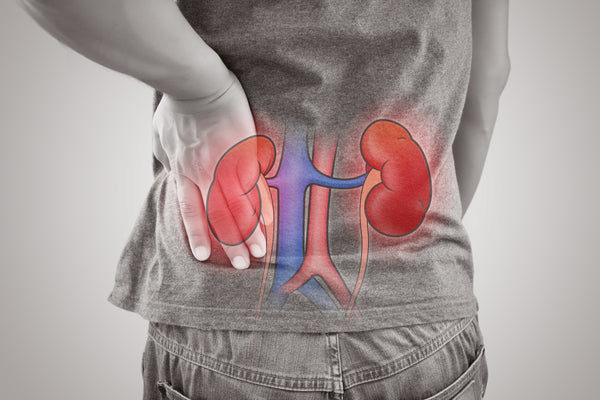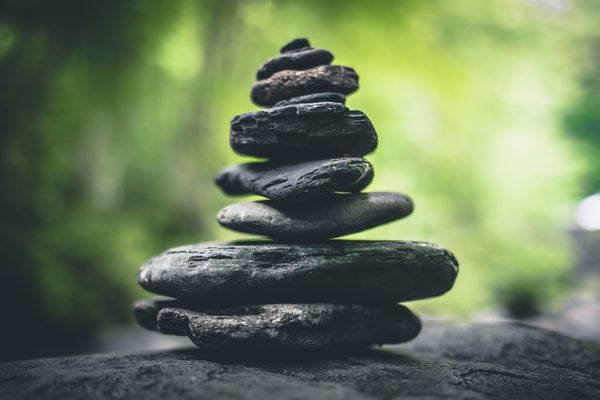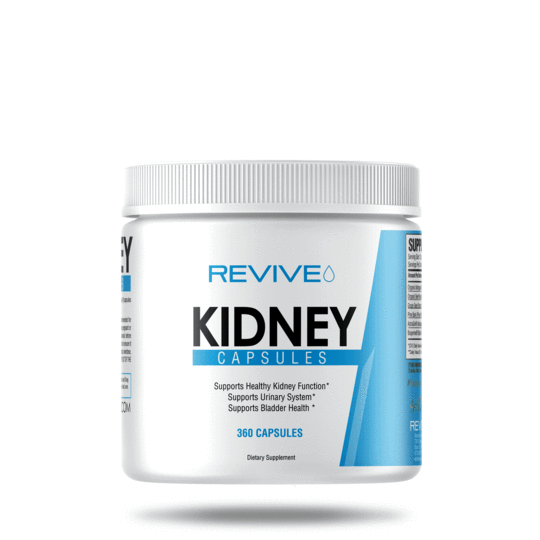Your kidneys are your body’s filtration system. They are a vital part of your urinary system, and without them, toxins would build up in the blood and cause you to become very ill indeed. Most of the time, if you’re healthy, kidneys do their job with very little interference required from you! But what does it mean if you suddenly start to experience pain in your kidneys?
How Kidneys Work

Everyone is born with two kidneys. They are about the size of your clenched fist and live one on either side of your spine just below the ribcage.
About 150 quarts of blood flow through your kidneys every day, and your kidneys filter that blood, taking out toxins. Water flushes these toxins into the bladder so that they can pass out in the urine. This is why hydration is so important for overall health and good kidney health.
Kidney health is often called renal health. The renal artery carries unfiltered blood to the kidney, and the renal vein carries freshly filtered blood away and back around the body. Kidneys also help maintain proper blood pressure and healthy red blood cells. If you’re experiencing kidney pain, it could be a sign of poor renal health.
What Is the First Sign of Kidney Problems?
How do you know if something is wrong with your kidneys? Some of the indications of a kidney problem include:
- Kidney pain
- Fatigue with no other obvious reason (e.g., poor sleep)
- Poor appetite
- Unexplained weight loss
- Muscle cramps
- Nausea
- Change in urination habits – blood in the urine is a red flag and should prompt a visit to the doctor immediately.
Kidney Pain Location
What does kidney pain feel like? This is one of the most important things to know if you are self-diagnosing kidney pain. Kidney pain symptoms are often described as a dull, deep pain low on either side of your body, often radiating around the back. Sometimes it’s on one side only, and sometimes it’s on both.
Pressure applied to the area may make the pain worse. It’s often discernable from normal back pain due to not being in any area with obvious muscle mass. Stretching and moving will often ease back or abdominal muscle pain. Activity will not usually affect kidney pain, but it may worsen it.
Causes of Kidney Pain
Kidney pain or renal pain can arise for a variety of reasons. These include, but are not limited to:
- Kidney trauma, literally, a wound or damage to the kidney perhaps caused by a fall
- Kidney disease or failure
- Obstructions such as kidney stones
- Kidney infections
Kidney Disease Stages
The stages of kidney disease are based on how well your kidneys are working. In other words, how efficiently they are removing toxins from your blood. If a doctor has concerns about your kidney health, they may do a urine test (checking for protein in the urine), a blood test, or even an ultrasound to assess the physical state of the kidneys.
The stages of kidney health are as follows:
- Stage 1: Normal to high function kidney, noted as 90% functionality or over
- Stage 2: Mild decline in functionality, possibly to as little as 60%
- Stage 3: Mild to moderate decrease in kidney function, dropping to 30% in some cases
- Stage 4: Severe reduction in kidney function, dropping to between 15 and 29%
- Stage 5: Kidney failure
Is Gout a Sign of Kidney Failure?
Gout is a swelling of the joints that can be very painful. It’s often worst in the toes or ankles, limiting mobility. It’s caused by too much uric acid in the blood, which then crystallizes painfully in the joints. Normally, your kidneys remove uric acid, which is why gout is sometimes linked to renal problems.
Gout can also be caused by poor diet, certain medications, or other health conditions. However, there is such a strong link between gout and kidney problems that if you develop any symptoms similar to gout, you should always get checked for kidney problems.

Kidney Stones
Kidneys stones are lumps of minerals and salts that become so large that the body can’t pass them in the urine. These cause blockages and pain, fever, chills, and a feeling that you constantly need to urinate. Treatment includes manual extraction or shockwave treatment to break the stone up inside the body.
Can Stress Cause Kidney Stones?
There is some correlation between stressful lifestyles and kidney stones. Stress may lead to decreased physical activity and poor diet, both of which can have a negative impact on renal health.
Kidney Infection
Much more common than serious renal failure is a kidney infection. Kidney infections often start as urinary tract infections (UTI) much lower down the urinary tract. If untreated, the infection can spread up to the kidneys, causing pain, nausea, and a feeling of general unwellness. Fever may also occur.
How to Keep Kidneys Healthy
You can optimize your kidney health by keeping your body hydrated, active when possible, and following a diet that includes:
- Plenty of antioxidants in foods like blueberries and red grapes
- Lower levels of sodium (salt)
- Lower levels of potassium (only relevant for those with a history of kidney problems)
- Omega-3 rich foods like sea bass
A high-quality supplements can boost kidney health, too. Revive’s Kidney Support capsules contain a range of ingredients, which may support blood flow and filtration, and protect the kidneys daily. Taking a supplement with water will also remind you to stay hydrated! 14 glasses of water daily can help your body and kidneys stay healthy.

Takeaway
Kidney pain can be a sign of blockage, infection, or the beginnings of kidney disease. A good diet and plenty of water plus intelligent supplements can boost kidney health.


